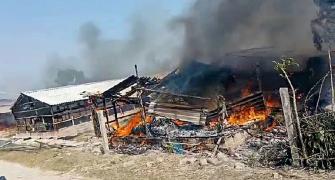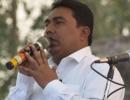The Calcutta high court on Wednesday directed that Trinamool Congress leader Shajahan Sheikh, the main accused in alleged sexual atrocities on women and land grabbing at Sandeshkhali, can be arrested by the CBI, the Enforcement Directorate (ED) or the West Bengal police.

On a prayer by the state's advocate general, the court clarified its order of February 26 in which it had ordered the arrest of Sheikh by the police authority.
A division bench presided by Chief Justice TS Sivagnanam clarified that the court in its February 7 order had only stayed the constitution of a joint special investigation team (SIT) of the CBI and West Bengal police by a single bench to probe an attack on ED officials.
The division bench directed that it will be "open to the CBI or the ED also to arrest" the absconding Sheikh, noting that he has been on the run for a substantial period.
The court said there are other cases registered against Sheikh as well, where he has been shown as an absconding accused.
Holding that a person elected to a public office cannot defy law, the court said it leaves it open to any one of the agencies to arrest him.
ED officials were attacked by a nearly 1,000-member strong mob at Sandeshkhali in West Bengal's North 24 Parganas district on January 5 when they went to search the premises of Sheikh in connection with its probe into an alleged ration distribution scam in the state.
The division bench directed that the suo motu matter over alleged sexual atrocities and land grabbing of people at Sandeshkhali will come up for hearing again on March 4.
Additional Solicitor General of India SV Raju, appearing for the ED, expressed apprehension that if the state police arrest Sheikh, there is a likelihood of the case being diluted by the state police as the CBI and the ED have serious reservations against them and that there is also an allegation that they are colluding with the absconding accused.
Advocate General Kishore Dutta, appearing for the West Bengal government, vehemently disputed such contention.
After the AG raised the issue seeking a clarification of the February 7 order, the CJ said it restrained police from investigating, but there is no stay on arrest of Sheikh.
The court said it had ordered the arrest of Sheikh and thereafter clarified there is no stay on the arrest of the accused.
The bench said it has already stated in its February 26 order that a person who is an elected representative in the North 24 Parganas zilla parishad cannot be permitted to be absconding.
It said the court has already taken notice that Sheikh is on the run and evading the law.
The court said the observations made in the order of February 7 "can never be read to be any impediment for arresting the said person."
It said the state police cannot shirk their responsibility in not apprehending the person who has been on the run for a substantial period of time.
The AG had on February 26 submitted that in four years till December 18, 2023, the local police registered 43 FIRs on various charges including rape, out of which chargesheet have been submitted in 42 cases.
In connection with the attack on ED officials on January 5, three FIRs were filed at Nazat police station in North 24 Parganas district on January 5 - one by an employee of Sheikh against the ED officials, another by the ED against Sheikh and his alleged accomplices and a suo motu FIR by the local police.
The ED and the state government had moved separate appeals challenging the single bench order. While the ED prayed that only the CBI be ordered to investigate the attack, the state prayed that its police be given the sole authority to probe the FIRs on the same.
Meanwhile, a PIL was filed by petitioner-lawyer Alakh Alok Srivastava praying for the transfer of investigation into the alleged sexual assault of women at Sandeshkhali to the CBI or to a SIT and formation of a committee of three retired high court judges to inquire into the matter.
The Supreme Court had earlier refused to entertain a PIL by him with similar prayers, but had granted him liberty to approach the Calcutta high court.










